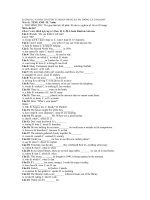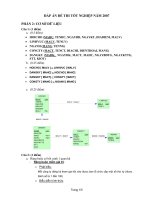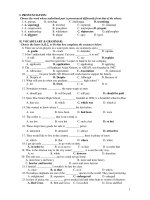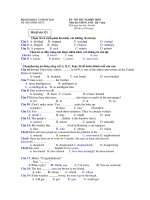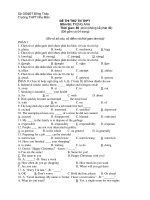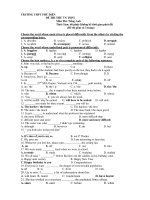De Tot Nghiep Anh 2007
Bạn đang xem bản rút gọn của tài liệu. Xem và tải ngay bản đầy đủ của tài liệu tại đây (112.05 KB, 4 trang )
<span class='text_page_counter'>(1)</span><div class='page_container' data-page=1>
<b>BỘ GIÁO DỤC VÀ </b>
<b>ĐÀO TẠO</b>
ĐỀ THI CHÍNH
THỨC
<b>KỲ THI TỐT NGHIỆP TRUNG HỌC PHỔ </b>
<b>THƠNG NĂM 2007</b>
<b>Môn thi: TIẾNG ANH - Hệ 7 năm</b>
<i>Thời gian làm bài: 60 phút; 50 câu trắc nghiệm (đề </i>
<i>thi có 03 trang)</i>
<b>Mã đề thi 130</b>
<b>Họ, tên thí </b>
<b>sinh</b>:...
...
...
<b>Số báo </b>
<b>danh</b>:...
...
.
..
<i><b>Xác định từ/cụm từ có gạch dưới (ứng </b></i>
<i><b>với A hoặc B, C, D) cần phải sửa để </b></i>
<i><b>những câu sau trở</b></i>
<i><b>thành chính xác.</b></i>
<b>Câu 1:</b> People are not allowed to enter the
park after midnight because lack of
security.
A
B
C D
<b>Câu 2:</b> I'd rather to stay at home than go
out at weekends .
A B C D
<b>Câu 3:</b> John's mother thought that
chocolates were bad to him .
A B C D
<b>Câu 4:</b> She is tired with being asked the
same thing everyday.
A B C D
<b>Câu 5:</b> They asked me what did happen
last night, but I was unable to tell them.
A B C
D
<i><b>Chọn từ (ứng </b></i>
<i><b>với A hoặc B, </b></i>
<i><b>C, D) có phần </b></i>
<i><b>gạch</b></i>
<i><b>trong mỗi câu </b></i>
</div>
<span class='text_page_counter'>(2)</span><div class='page_container' data-page=2>
<i><b>chân được </b></i>
<i><b>phát âm khác </b></i> <i><b>với những từ </b><b>còn lại</b></i>
<b>Câu </b>
<b>6:</b>
<b>Câu </b>
<b>7:</b>
<b>Câu </b>
<b>8:</b>
<b>Câu </b>
<b>9:</b>
<b>A.</b>
gold
en
<b>A.</b>
sunri
se
<b>A.</b>
lose
<b>A.</b>
chea
p
<b>B.</b>
grov
e
<b>B.</b>
shut
<b>B.</b>
wom
en
<b>B.</b>
child
<b>C.</b>
chos
en
<b>C.</b>
busin
ess
<b>C.</b>
prov
e
<b>C.</b>
chair
<b>D.</b> cover
<b>D.</b>
summer
<b>D.</b> movie
<b>D.</b>
chemist
<b>C</b>
<b>â</b>
<b>u</b>
<b> 10:</b>
<b>A.</b>
<b>B.</b>
sign
<b>C.</b>
light
<b>D.</b> might
<i><b>Chọn từ/cụm từ </b></i>
<i><b>thích hợp (ứng với</b></i>
<i><b>A hoặc B, C, D) để</b></i>
<i><b>hoàn thành mỗi </b></i>
<i><b>câu sau.</b></i>
<b>Câu 11:</b> Glass is
usually _____
sand.
<b>A.</b>
mad
e
from
<b>B.</b>
made
of
<b>C.</b>
made
by
<b>D.</b> made
with
<b>Câu 12:</b> They
worked hard _____
they could pass the
final examination.
<b>A.</b>
since
<b>B.</b>
becau
se
<b>C.</b> in
case <b>D.</b> so
that
<b>Câu 13:</b> The
weather was
terrible. I wish it
_____ warmer.
<b>A.</b>
were
<b>B.</b> was
<b>C.</b>
has
been
<b>D.</b>
had
been
<b>Câu 14:</b> The
students in this
class were made
_____ very hard.
<b>A.</b>
learn
ing
<b>B.</b>
havin
g
learnt
<b>C.</b>
learn
<b>D.</b> to
learn
<b>Câu 15:</b> Up to now, I _____ a lot of
information about her.
<b>A</b>
<b>.</b>
w
ill
lear
n
<b>B.</b> learnt
<b>C.</b> would
learn
<b>D.</b> have learnt
<b>Câu 16:</b> How _____ is your father?
<b>A</b>
<b>.</b>
aliv
e
<b>B.</b> tall
<b>C.</b> high
<b>D.</b> single
<b>Câu 17:</b> My parents first _____ each other
at the Olympic Games in 1982.
<b>A</b>
<b>.</b>
ha
d
mee
t
<b>B.</b> met
<b>C.</b> have
met
<b>D.</b> meet
<b>Câu 18:</b> She has worked as a secretary
_____ she graduated from college.
<b>A</b>
<b>.</b>
sinc
e
<b>B.</b> until
<b>C.</b> before
<b>D.</b> while
<b>Câu 19:</b> Jim is five centimeters _____
than Tom.
<b>A</b>
<b>.</b> higher<b>B.C.</b> taller tallest <b>D.</b> tall
<b>Câu 20:</b> If I had time, I _____ to the
beach with you this weekend.
<b>A</b>
<b>.</b>
w
ill
go
<b>B.</b> will
have gone
<b>C.</b> would
have gone
<b>D.</b> would go
<b>Câu 21:</b> His pronunciation causes me a lot
of _____.
<b>A</b>
<b>.</b>
di
ffi
culti
es
<b>B.</b>
difficult
<b>C.</b>
difficulty
<b>D.</b> difficultly
</div>
<span class='text_page_counter'>(3)</span><div class='page_container' data-page=3>
<b>Câu 22:</b> Jack insisted that he didn’t need any help, _____ I helped him anyway.
<b>A.</b> but <b>B.</b> besides <b>C.</b> however <b>D.</b> so
<b>Câu 23:</b> My uncle _____ you met yesterday is a lawyer.
<b>A.</b> which <b>B.</b> what <b>C.</b> whose <b>D.</b> whom
<b>Câu 24:</b> The old man is said _____ all his money to an old people's home when he died.
<b>A.</b> have left <b>B.</b> to leave <b>C.</b> to have left <b>D.</b> to leaving
<b>Câu 25:</b> Don't waste time _____ that broken vase.
<b>A.</b> mending <b>B.</b> mend <b>C.</b> for mending <b>D.</b> to mend
<b>Câu 26:</b> She failed the test, _____ she studied hard.
<b>A.</b> as <b>B.</b> in spite of <b>C.</b> despite <b>D.</b> although
<b>Câu 27:</b> Hung: “Thank you very much for a lovely party.”
Hoa: “_______. ”
<b>A.</b> Thanks <b>B.</b> Have a good day <b>C.</b> You are welcome <b>D.</b> Cheers
<b>Câu 28:</b> When I came to visit her last night, she _____ a bath.
<b>A.</b> is having <b>B.</b> was having <b>C.</b> has <b>D.</b> had
<b>Câu 29:</b> Dien Bien Phu is the place _____ our army won a resounding victory in 1954.
<b>A.</b> where <b>B.</b> that <b>C.</b> what <b>D.</b> which
<b>Câu 30:</b> He had no_____ of selling the clock - it had belonged to his grandfather.
<b>A.</b> interest <b>B.</b> intend <b>C.</b> intention <b>D.</b> meaning
<b>Câu 31:</b> I knew they were talking about me _____ they stopped when I entered the room.
<b>A.</b> because <b>B.</b> so that <b>C.</b> despite <b>D.</b> therefore
<b>Câu 32:</b> I regret _____ you that your application has been denied.
<b>A.</b> inform <b>B.</b> to have informed <b>C.</b> to inform <b>D.</b> informing
<b>Câu 33:</b> Neither you nor I _____ responsible for the bad result.
<b>A.</b> are <b>B.</b> be <b>C.</b> am <b>D.</b> is
<b>Câu 34:</b> Wait here until I _____ you.
<b>A.</b> am going to call <b>B.</b> call <b>C.</b> will call <b>D.</b> am calling
<b>Câu 35:</b> The sick man still finds it _____ to stand without support.
<b>A.</b> comforting <b>B.</b> discomfort <b>C.</b> uncomfortable <b>D.</b> comfortable
<i><b>Đọc kỹ đoạn văn sau và chọn phương án đúng (ứng với A hoặc B, C, D) cho mỗi chỗ trống từ 36</b></i>
<i><b>đến 40.</b></i>
The world’s first film was shown in 1895 by two French brothers. Although it only (36)______
of short, simple scenes, people loved it, and films have been popular ever since. The first films were
silent, with titles on the screen to explain the story.
Soon the public had (37)________ favourite actors and actresses and, in this way, the first film
stars appeared. In 1927, the first “talkie”, a film with sound, was shown and from then on, the public
would only accept this kind of film.
Further improvements continued, particularly in America, (38)________ most of the world’s
films were produced. With the arrival of television in the 1950s, (39) _______people went to see
films, but in recent years cinema audiences have grown again. More countries have started to
produce films that influence film making and there are currently (40)________national film
industries.
<b>Câu 36: A.</b> considered
<b>Câu 37: A.</b> your
<b>Câu 38: A.</b> who
<b>Câu 39: A.</b> other
<b>Câu 40: A.</b> much
<b>B.</b> consisted
<b>B.</b> their
<b>B.</b> which
<b>B.</b> each
<b>B.</b> lots
<b>C.</b> held
<b>C.</b> his
<b>C.</b> where
<b>C.</b> any
<b>C.</b> plenty
<b>D.</b> belonged
<b>D.</b> our
<b>D.</b> when
<b>D.</b> fewer
<b>D.</b> many
<i><b>Chọn phương án đúng (ứng với A hoặc B, C, D) để hoàn thành mỗi câu sau.</b></i>
<b>Câu 41:</b> We lived in that _____ on the corner.
<b>A.</b> old house brick small
<b>C.</b> small old brick house <b>B.D.</b> brick small old house house brick small old
<b>Câu 42:</b> He took his seat quietly _____.
</div>
<span class='text_page_counter'>(4)</span><div class='page_container' data-page=4>
<b>A.</b> so as not to disturb their conversation
<b>B.</b> so as to disturb their conversation
<b>C.</b> in order not disturb their conversation
<b>D.</b> in order for him not to disturb their conversation
<b>Câu 43:</b> If I had enough money, _____.
<b>A.</b> I will buy that house
<b>C.</b> I can buy that house
<b>Câu 44:</b> _____ that no one would ask for tips.
<b>A.</b> The tourists found it strange
<b>C.</b> The tourists found strange
<b>Câu 45:</b> Dr Sales is the person _____.
<b>A.</b> in that I don't have much confidence
<b>C.</b> I don't have much confidence
<b>B.</b> I could buy that house
<b>D.</b> I am buy that house
<b>B.</b> The tourist were strange to find
<b>D.</b> It found strange tourists
<b>B.</b> whom I don't have much confidence in him
<b>D.</b> in whom I don't have much confidence
<i><b>Đọc kỹ đoạn văn sau và chọn phương án đúng (ứng với A hoặc B, C, D) cho mỗi câu từ 46 đến</b></i>
<i><b>50.</b></i>
It is very important to have healthy teeth. Good teeth help us to chew our food. They also help
us to look nice. How does a tooth go bad? The decay begins in a little crack in the enamel covering of
the tooth. This happens after germs and bits of food have collected there. Then the decay slowly
spreads inside the tooth. Eventually, poison goes into the blood, and we may feel quite ill.
How can we keep our teeth healthy? Firstly, we ought to visit our dentist twice a year. He can
fill the small holes in our teeth before they destroy the teeth. He can examine our teeth to check that
they are growing in the right way. Unfortunately, many people wait until they have toothache before
they see a dentist. Secondly, we should brush our teeth with a toothbrush and fluoride toothpaste at
least twice a day - once after breakfast and once before we go to bed. We can also use wooden
toothpicks to clean between our teeth after a meal. Thirdly, we should eat food that is good for our
teeth and our body: milk, cheese, fish, brown bread, potatoes, red rice, raw vegetables and fresh fruit.
Chocolates, sweets, biscuits and cakes are bad, especially when we eat them between meals. They are
harmful because they stick to our teeth and cause decay.
<b>Câu 46:</b> Good teeth mainly help us to _____.
<b>A.</b> look nice <b>B.</b> chew our food <b>C.</b> look important <b>D.</b> have good eyesight
<b>Câu 47:</b> When food and germs collect in a small crack, our teeth _____.
<b>A.</b> become hard
<b>C.</b> begin to decay
<b>B.</b> make us feel quite ill
<b>D.</b> send poison into the blood
<b>Câu 48:</b> A lot of people do not visit a dentist until _____.
<b>A.</b> they have toothache
<b>C.</b> they have brushed their teeth
<b>Câu 49:</b> What may be most harmful to our teeth?
<b>B.</b> they have holes in their teeth
<b>D.</b> their teeth grow properly
<b>A.</b> red rice <b>B.</b> raw vegetables <b>C.</b> fresh fruit <b>D.</b> sweet things
<b>Câu 50:</b> The best title for the passage would be _____.
<b>A.</b> “How to keep our teeth healthy”
<b>C.</b> “How to clean our teeth”
<b>B.</b> “How to make our teeth nicer”
<b>D.</b> “How to keep our teeth ever white”
--- HẾT
</div>
<!--links-->
